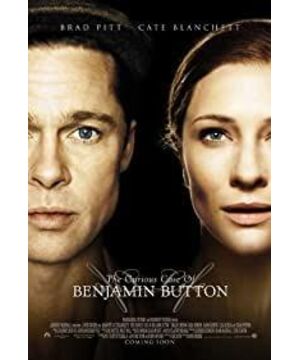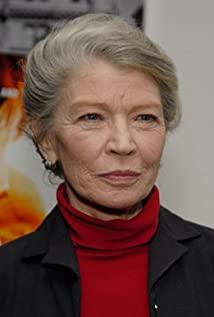The first thing to note is that I watched this film with an "adventure" mood, but in the end I got a completely different feeling, so without any spoilers, Benjamin's life is for me. It is shocking extraordinary. Before this, I had never imagined that David Fincher would make such a slow-moving and complete narrative film. Compared with "Fight Club", "The Seven Deadly Sins" and more recently "The Girl with Dragon Tattoo", these crime suspenses, which are even extremely similar to the beginning of the movie, are exciting enough, but they are also aesthetically tired. The whole movie is whispering, without the weird scenes and fast narratives in the above-mentioned several movies, and there is no bloody and violent dark city with fast pace and excitement. A movie of two hours and forty-six minutes will not make people feel lengthy at all, because it describes a person's life.
The surprise is obviously not just the director. One of the screenwriters of this film is Eric Rose, the screenwriter of the 1995 Oscar for Best Picture "Forrest Gump". Here, however, we do not see the wildness of foolish optimism, those dauntless American dreams and overly artificial history interspersed. Benjamin Button is still wrapped in the torrent of history without any suspense, but he can't change anything, whether it's American history or his own life. Here, although Eric Rose’s expression is the same as in "Forrest Gump", the content of expression is quite different, and his skills are higher. Benjamin is no longer a hero, but he is more resilient than Forrest. Some people say that "The Curious Case of Benjamin Button" has a narrative flaw, that is, it describes too little of Benjamin's life in the second half (perhaps the first half). But I think this is exactly what Rose meant. No matter what Benjamin did and how much he grew up, these audiences don’t need to know, because from the deep voice and sad eyes when Pete returns again, we can see all those extraordinary experiences; and on the other hand In general, the few words in poems are the most in line with Benjamin’s character.
Mention of Benjamin undoubtedly refers to his actor Brad Pitt. It's really hard for him to give such a deep role to Pete of Sagittarius. However, I don't think he ruined this role. Some people say that many awards nominations for Pete to be the best actor are just because of the makeup and technology. This obviously seriously underestimates Pete’s efforts in this film and the term "rejuvenation" (or this phenomenon) itself. The connotation of this story and this character. Does an actor have to play a man-eating monster like Anthony Hopkins in "The Silent Lambs" to be eligible to "hold the villain"? I think the answer is self-explanatory. Benjamin was destined to be peaceful all his life. He used to watch life and death in the nursing home for the first half of his life, and traveled all over the world in the second half of his life; he had a father who sits on Jinshan and a lowly black mother; he once owned everything for a short time, and then missed them in an instant; this is It made him sad and poetic, and it was also the reason why he couldn't win the prize.
Therefore, "The Curious Case of Benjamin Button" is first of all about life and life. Some people think that this is a movie that says nothing, I think it is inevitable. The diary can only be narrative. The diary will not provide any experience and value to people, but it will record everything and let the people with the mind get it and the people with emotions. No one knows how to live, no one knows why they died, the audience does not know, the director does not know, and the actors do not know. However, time is not as stubborn as a human being. Whether it is going forward or backward, it will not stop, nor will it provide any similar constructive opinions such as "how to live". Some people think that there is no difference between "rejuvenating" and "not rejuvenating". I think this is also a misunderstanding. Benjamin seems to be at odds with other people’s lives, or even contradicts himself, but what is tragic is that he was actually unable to return to his childhood from beginning to end—and what separates Benjamin from other people is "life and death", plus "Time" is on; even "time" comes first and "life and death" comes later, which shortens his happiness. This is like a math problem in elementary school. If two cars are in the same direction, they can go with each other at different ends; and if they face each other, they can only meet in a certain place at a certain moment, and there will be no half-intersections ever since. Therefore, the incompetence and fragility of life that people can often perceive is strengthened by Benjamin. The white horse passed the gap and the sparks flashed, and Benjamin's life passed in such a hurry. This is a symmetrical story, a story that can only be viewed as a tragedy upside-down. For example, if the movie is played backwards, the second hand of the clock will rotate, and Benjamin can also live a normal life and experience everything that a normal person can experience, but he will still miss everything.
Of course, "life has no ifs." But Benjamin did not give up his life and life. The desire for the other side of the street corner, the thirst for sailing adventures, and all the unknown enthusiasm in the mouth of the black dwarf can make him stand upright and walk around the world a little bit. Also accidentally, the author made the original soundtrack of "The Curious Case of Benjamin Button" (it’s worth mentioning that the soundtrack of the film, Alessandro Displatt, after discussing with the director, also made the original sound reversible. Put it into a tune. Dispratt’s soundtrack can be described as "weird and soothing", which is very in line with the tone of the film. This sentence is found in the booklet:
Life can only be understood backward, but it must be lived forward .
You must look back and understand life, but in life you must move forward. I think this sentence can already summarize most of the meaning of the whole film.
This is how Benjamin lives in this world. There is not much time left by fate, he can only taste it. Anyone in his life will become a hurried passerby, whether it is a woman who failed to cross the English Channel, an old man who has been scorched by lightning seven times, or those crewmates who have fought together and rushed to the submarine. However, these people without exception told Benjamin a truth, no matter how rebellious the fate, you should not lose the courage to pursue, just like a hummingbird on the sea, once it stops flapping its wings, it will die of starvation.
However, in any case, "The Curious Case of Benjamin Button" can never be regarded as an inspirational comedy (after all, almost all the characters on the stage are dead), and it is not just about life. It is also about love, whether it is maternal love, love or friendship, all of these love are the most important support for Benjamin to live. Some people teach him to read, some people teach him to play the piano, some people give him a haircut, and some people play with him. Just as Benjamin himself felt, the nursing home is a place where there is no fight. Everyone will enjoy his twilight years and at the same time create A space to enjoy. Until one day, he ceased to be the heir of endless love, but became the giver of love. Until later, Mr. Patton, who had abandoned Benjamin without hesitation, suddenly appeared and told Benjamin that he was his biological father. Queenie heard swearing at Button, but Benjamin came back to Mr. Button because of these curses: because he was too familiar with the feeling of being abandoned by his relatives, and too familiar with the infinite love that was once given. If everyone's old age is a Benjamin-like new born, then everyone should be forgiven before dying.
Mr. Patton passed away not long after. Although Queenie cursed, he stood in front of Patton's coffin in the end. Looking around, she began to admire the luxury and decentness of the funeral, but ignored the entire hall, which was too quiet.
The most moving thing in the film is undoubtedly the enduring love affair between Benjamin and Daisy. When Benjamin was an old man on crutches and Daisy was a beautiful and innocent little girl, they would sneak under the table in the dead of night, light a candle, and confide secrets to each other; until Benjamin lay quietly on Daisy In his arms, frowning and looking at her for the last time, their love has never really stopped. This so-called "extreme world" does not surprise us that two people with such a big difference in appearance age can love each other like this, but it makes people amazed by their persistence and courage, even though this persistence and courage are not formed congenitally. , The day after tomorrow, he has placed Benjamin out of her life several times, even though Daisy was still so young and obsessed with her short and impermanent "career". After experiencing the most violent ups and downs and stumbles in life, what else is worth worrying about and cherishing?
Love is often such a thing. Only when you feel you are about to lose can you hold on to it and learn to cherish it.
The heroine Cate Blanchett said that the heroes and heroines in the film are so lucky to find their loved ones to live with. If you think about it, I'm afraid it's right. Not only is there no "eternity" in the world, but I am afraid that even the "temporary" does not necessarily exist. So if you really get the temporary, why bother with yourself and lament your time. Daisy hated her aging for a while, watching her most beloved one getting younger day by day, but she was getting older day by day. The lead was gone, whether it was the unsatisfactory legs or the wrinkles on those unsatisfactory faces reminded her of the passing of her life, and compared to Benjamin, this passing was only so obvious in her own body. But when they sit cuddling on the beach, watching the sun slowly and uncontrollably rush out of the horizon, you can feel so clearly that life is still going on, no matter how old or haggard it is, as long as the sun is still Can shoot into the eyes, as long as the hands can still perceive the world-as long as the lover is still around, what can be lost and sad? No matter how short a moment is, it becomes beautiful. They calmly walk towards the end with all the perception of the result, because for them, cherishing time, cherishing life and cherishing themselves are the best footnotes to love. They can dive into the water in the moonlight, bet playfully in the storm, gaze affectionately in the mirror, and sweat on the mattress.
People are destined to separate. Fortunately, life and love can be so perfectly combined.
One day, time will still swallow memory ruthlessly, unable to remember his appearance, unable to call his name, unable to stretch out his hands, and unable to see the figure. Fortunately, there was a time.
Some people, are born to sit by a river; some are struck by light.
Some have an ear for music; some are artists.
Some swim; some, know buttons.
Some know Shakespeare; some are mothers.
And some people, dance.
"The Curious Case of Benjamin Button", which can discuss these issues, has far exceeded the limit of the 2009 Oscar best film "Slumdog Millionaire" competing with it. But the connotation of this film does not stop there. Although the involvement of the status of black Americans and American history is far less than the narrative of life and love that takes up a large amount of space, the side effects of the screenwriter and director are also enough to move people. Although the three awards for best make-up, best visual effects and best art direction are unfair to this film, "The Curious Case of Benjamin Button" is enough to surpass some inaccurate films and rank among the most classic films. Life and love do not distinguish race, rich or poor, and national boundaries. Of course there is still age and time.
View more about The Curious Case of Benjamin Button reviews











